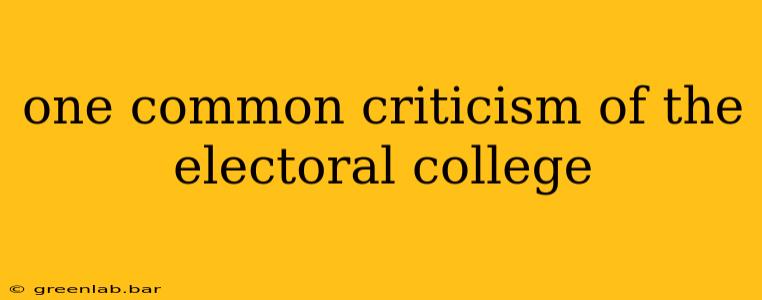The Electoral College, a cornerstone of the American presidential election system, is frequently lauded for its historical context and intended purpose. However, one of the most persistent and potent criticisms leveled against it centers on the winner-take-all system employed by most states. This system, where the candidate who wins the popular vote in a state receives all of that state's electoral votes, irrespective of the margin of victory, is seen by many as fundamentally undemocratic and disproportionately influential.
The Distortion of Popular Will
The core issue lies in the potential disconnect between the national popular vote and the Electoral College outcome. A candidate could win the presidency without securing the majority of the national popular vote, a scenario that has occurred on several occasions in US history. This outcome directly contradicts the principle of "one person, one vote," a foundational tenet of democratic governance. In essence, the winner-take-all system allows for a situation where the votes of individuals in a losing state are effectively rendered null and void in the presidential election, while the votes of individuals in a winning state, regardless of margin, are amplified.
Examples of the Distortion
Consider a scenario where Candidate A wins a state by a narrow margin of 51% to 49%. Candidate A receives all of that state's electoral votes, effectively negating the preferences of the 49% who voted for Candidate B. This disparity is magnified when considering states with larger populations; a small difference in the popular vote in a populous state can translate into a substantial shift in the electoral vote count. Conversely, in smaller states, a comparatively smaller number of votes can hold disproportionate weight in determining the outcome of the election.
The Impact on Voter Turnout and Engagement
The winner-take-all system also impacts voter turnout and engagement. In states where the outcome is consistently predictable (i.e., "safe" states for one party or the other), voters may feel their individual vote holds less significance, potentially leading to decreased participation. This effect disproportionately impacts voters in states where one party holds a dominant position, further exacerbating the issue of unequal representation.
Marginalization of Voters in "Safe" States
This marginalization of voters in "safe" states not only undermines the democratic ideal of equal participation but also contributes to a sense of political disenfranchisement. Citizens in these states may feel their voices are less heard, potentially fostering cynicism and apathy towards the electoral process. This outcome is antithetical to a healthy and robust democracy that thrives on active citizen participation.
Conclusion: A Need for Reform?
The winner-take-all aspect of the Electoral College is a significant source of criticism due to its potential to distort the popular will, disproportionately influence election outcomes, and disengage voters. The argument for reform often centers on the need to ensure a system that accurately reflects the preferences of all voters and upholds the fundamental principles of democratic governance. Whether through amending the Constitution or through alternative mechanisms like the National Popular Vote Interstate Compact, the debate surrounding the Electoral College and its winner-take-all system remains a central point of contention in American political discourse.

